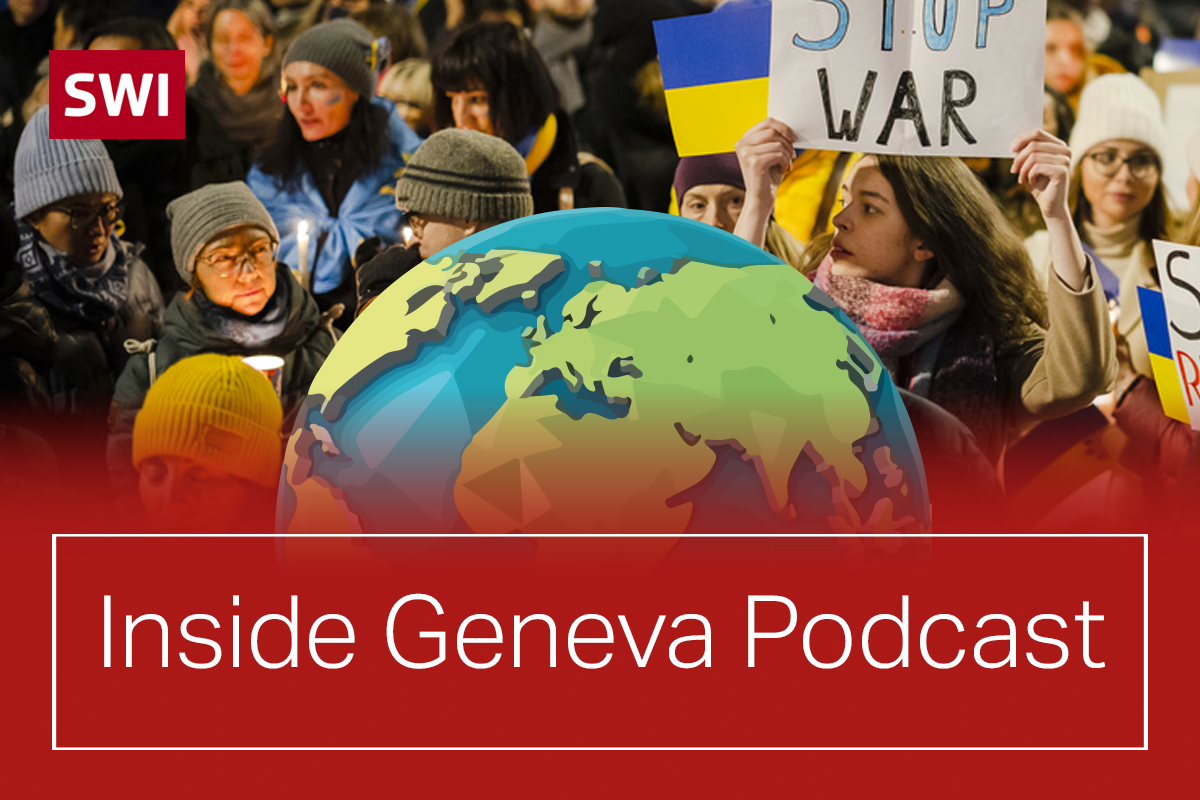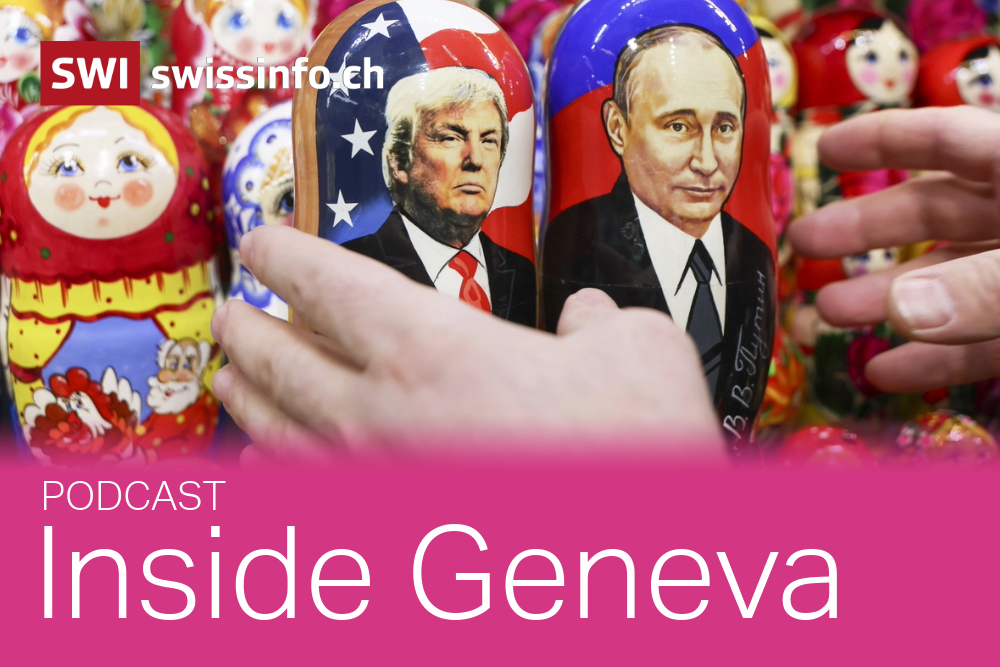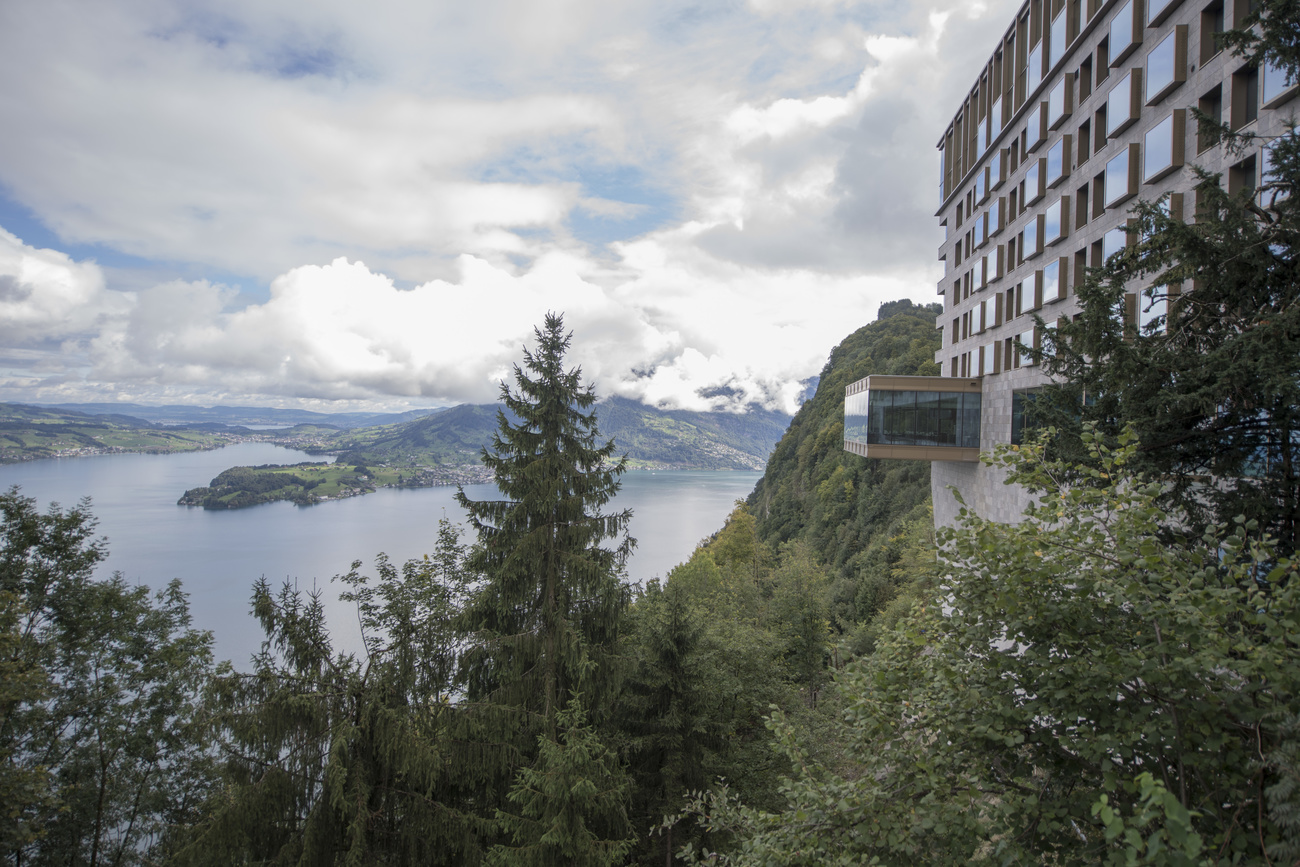Ukraine: peace or appeasement?
It’s been three years since Russia launched its full-scale invasion of Ukraine. On each anniversary of that dark day, Inside Geneva has brought you a special episode, focusing on the conflict.
On the first anniversary we optimistically discussed “How to make peace” where our guest Hiba Qasis of Principles for Peace, a Geneva-based foundation, reminded us that “peace is beyond the absence of violence. It’s really about access to justice, economic opportunities, security and pluralism.”

More
Inside Geneva: how to make peace
On the second anniversary, we analysed the state of the war after two long years of grinding conflict.
My colleague Gunilla von Hall, who has made many reporting trips to Ukraine over the last three years, asked “Isn’t there a limit, when there are so many civilian deaths, that you as a state have a responsibility to stop?”

More
Inside Geneva: the war in Ukraine – what’s next?
And while we agreed that Vladimir Putin’s original plan to seize all of Ukraine seemed less and less achievable, Professor Jussi Hanhimäki of Geneva’s Graduate Institute warned that peace or even a ceasefire still seemed far away. “With this particular cast of characters, it’s not going to happen. With Putin on the one side and (Volodymr) Zelenskyy and his entourage {on the other}. They’re committed to victory, whatever that is.”
A new sheriff in town
Now though, as Ukraine’s defenders in Europe were told so bluntly at the Munich Security Conference, “there is a new sheriff in town.” United States Vice-President JD Vance’s astonishingly disrespectful speech, in which he lectured European leaders about free speech and democracy, caused shock and anger.
Vance had been expected to share US strategy on achieving peace in Ukraine with his European colleagues – after all his boss President Donald Trump had said throughout his election campaign that he would “do a deal” in “24 hours.” Instead, Vance riffed on things he thought he knew about Europe, but clearly didn’t, suggesting the continent’s real threats came not from Russia or China, but from an “enemy within”.
He claimed, falsely, that free speech was being suppressed in Europe, he accused its political leaders of being “frightened of their voters.” This, from a vice-president who has backed “don’t say gay” laws in the US, whose administration is banning books from libraries and journalists from the Oval Office, was too much for German defence minister Boris Pistorius, who described Vance’s speech as totally unacceptable.

More
US-Russia talks on Ukraine: peace or appeasement?
But Vance, disrespectful and ill-informed though he is, is a distraction. The real question is what sort of peace the “new sheriff”, Trump, thinks he can achieve in Ukraine. That’s our topic this week, on our special third anniversary edition of Inside Geneva.
Our guests are three journalists who have reported on and thought deeply about the war in Ukraine since it began: Nick Cumming-Bruce, contributor to the New York Times in Geneva, Laurent Sierro, UN correspondent for Swiss News Agency Keystone-ATS, and of course Gunilla von Hall, of Swedish daily Svenska Dagbladet.
The art of the deal?
So was Trump’s surprise phone call to Putin the start of genuine peace negotiations? Or is it something more transactional? It is perhaps no coincidence that the first member of the new Trump administration to visit Ukraine was not the secretary of state, not the defence secretary, but the treasury secretary Scott Bessent, who handed Zelensky a contract signing away Ukraine’s rare earth minerals to the United States – a contract that contained no promise of future protection.
Cumming-Bruce sees Trump’s call with Putin as not only naïve, but as a complete rejection of international law and of old alliances. There was “no sense at all that he was dealing with someone who had violated the United Nations Charter,” Cumming-Bruce tells Inside Geneva. “Someone who had butchered thousands of people, committed numerous atrocity crimes.”
And von Hall, who knows firsthand that Ukrainians are “very tired, and want the war to end”, also tells us that Trump’s actions are “from Ukraine’s point of view seen very much as a betrayal.” The US demand to own the rare earth minerals (something Zelensky has refused), is, von Hall says, being seen as “blackmail.”
What’s more, the US strategy of talking only to the Russians, without Ukraine, Europe (let alone the United Nations) being at the table, risks ostracising the very people and countries who are most invested in a sustainable peace. But, Sierro tells us, Trump has little interest in more multilateral negotiations.
“The only language that Trump understands is the language of the deal. And for him, deal means bilateral agreements between only two stakeholders.”
Sierro also reminds us that the diplomatic efforts of neutral Switzerland, which invested a great deal of time and money trying to lay the ground for an inclusive peace process, holding a “summit for peace” in June last year have all been in vain. Describing it as “an important diplomatic defeat”, Sierro believes the Swiss government is trying, but so far failing, to keep “channels open” to both Washington and Moscow.

More
How the Ukraine conference in Switzerland aims to find a path to peace
To hear the whole discussion, listen to Inside Geneva. We ask some hard questions: can Europe trust the US? Has Europe been complacent? Who benefitted from the trans-atlantic alliance and is that alliance now over? And what about the UN? Does it have a role at all?
We don’t have all the answers, but there is consensus from our seasoned UN correspondents: peace negotiations are often long, and complicated. They require patience, compromise and inclusivity. Sierro sums it up well.
“We will never be able to talk about peace and sustainable peace as long as the Ukrainians are not associated with that {the negotiations and the agreement} because the grievances will remain.” A reminder of how I started this newsletter, with the words of Hiba Qasis on the first anniversary of Russia’s invasion two years ago, “peace is beyond the absence of violence. It’s really about access to justice, economic opportunities, security and pluralism.”
vm/

In compliance with the JTI standards
More: SWI swissinfo.ch certified by the Journalism Trust Initiative










You can find an overview of ongoing debates with our journalists here . Please join us!
If you want to start a conversation about a topic raised in this article or want to report factual errors, email us at english@swissinfo.ch.